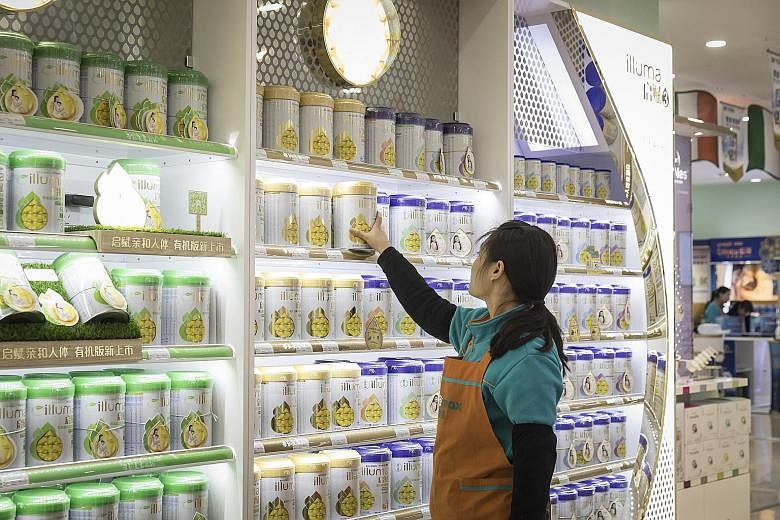SHANGHAI • A safety overhaul of China's notorious baby formula industry removed about 1,400 products from store shelves this week, clearing the way for international brands such as Nestle and Danone to grab greater shares of a US$20 billion (S$26 billion) market.
The regulations, effective from Jan 1, require factories making formula to register those products with China's Food and Drug Administration (FDA) and pass safety inspections. Plants are also limited to working with three brands.
Products not certified by the government have been banned from sale. Those typically came from smaller, sometimes dubious local brands that use generic powder and put their own labels on it.
With the new laws, they have been shoved out of factories in favour of multinational heavyweights with enough demand - and consumer trust - to keep manufacturing lines running at capacity.
"Making formula is random and changes so frequently, and companies put forward so many concepts that consumers find it difficult to choose," said secretary-general Liu Xuecong of the government-supervised China Nutrition and Health Food Association.
The FDA has approved 940 infant formula products from 129 factories so far, the agency said. That compares with over 2,300 formulations available before Jan 1.
The shake-up, in line with President Xi Jinping's call to improve the quality of life for Chinese, has its roots in a 2008 scandal in which melamine-tainted milk and formula killed at least six infants and sickened tens of thousands more.
-
940
Infant formula products approved by China's FDA so far.
1,400
Products removed from store shelves this week.
Even after a crackdown, scandals continued. In 2016, Shanghai police arrested nine people for producing and selling fake formula under the brand names Similac and Beingmate. As recently as November, more than 18,000 cans of infant formula by Xinjiang Western Animal Husbandry were found to contain expired ingredients.
Mothers paranoid about what they are feeding their babies often turn to more expensive foreign brands that they assume contain better ingredients and have passed stricter safety checks. That vaulted Nestle, Danone and Reckitt Benckiser Group into the top spots in the US$20 billion market, according to Euromonitor International.
"If the quality is good, I'll buy it, even if the price is high," said Ms Zhou Liwen, 34, mother of a three-year-old son.
Foreign firms are especially targeting parents in China's secondary cities and countryside, where local brands typically dominated.
With the relaxation of China's one-child policy, Reckitt Benckiser anticipates about 20 million babies being born annually, which could trigger an annual growth rate of at least 7 per cent in the infant formula category in the next five years, the firm said.
BLOOMBERG

